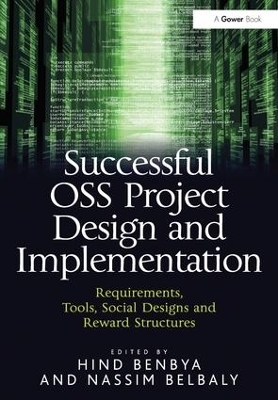
Successful OSS Project Design and Implementation
Gower Publishing Ltd (Verlag)
978-0-566-08795-0 (ISBN)
The open source phenomenon has attracted an increased interest among commercial firms and governments. It is becoming one of the most influential paradigm shifts not only in software development but in social and economic value creation as well. While software development is perhaps the most prominent example of open source, its principles have now been applied across a wide range of product classes, industries and even scientific disciplines. Decision makers at different levels and in a variety of fields need to improve their understanding of the factors that contribute to the Open Source Software (OSS) effectiveness: approaches, tools, social designs, reward structures and metrics. Successful OSS Project Design and Implementation provides a state-of-the-art analysis of OSS design principles, their emergence and success and how they are extending well beyond the domain of software.
Hind Benbya is Associate Professor of Information Technology (IT) Management at GSCM-Montpellier Business School in France. Her research consists of designing and implementing complex IT (for example, knowledge management systems, internal knowledge markets and co-creation communities). She spent the last 7 years working with leading firms in Europe and the United States to develop theories, models, and frameworks to better understand how complex IT create value. Nassim Belbaly is Associate Professor of Information Technology Management and Dean of Academic Affairs at GSCM-Montpellier Business School, France. Before joining GSCM, he was Visiting Scholar and Principal Researcher at the Anderson Business School at UCLA, Los Angeles.
Contents: Preface; Introduction; Part I OSS Emergence and Development: The principles of distributed innovation. Karim Lakhani and Jill Panetta; Firms' participation in free/open source projects: theory and preliminary evidence, Andrea Bonaccorsi, Dario Lorenzi, Monica Merito and Cristina Rossi; Open source software in the public sector: results from the Emiglia-Romagna open source survey (EROSS), Francesco Rentocchini and Dimitri Tartari. Part II OSS Rewards' and Incentives' Structure: What motivates developers in OSSP?, Hind Benbya; Social capital in OSS communities: a cross-level research model, JiJie Wang and Dan Robey; How far do informal credits in free software go?, Matthias Bärwolff. Part III OSS Success, Measurement and Metrics: Studies of success in open source software projects, Katherine Stewart; FLOSS project effectiveness measures, Kevin Crowston and James Howison; A little fish in a big pond: a comparison of active sourceforge OSS projects with very popular non-sourceforge OSS projects, Austen Rainer and Stephen Gale; Index.
| Erscheint lt. Verlag | 28.2.2011 |
|---|---|
| Sprache | englisch |
| Maße | 174 x 246 mm |
| Gewicht | 560 g |
| Themenwelt | Kunst / Musik / Theater ► Design / Innenarchitektur / Mode |
| Informatik ► Office Programme ► Outlook | |
| Sozialwissenschaften ► Kommunikation / Medien ► Buchhandel / Bibliothekswesen | |
| Wirtschaft ► Betriebswirtschaft / Management ► Logistik / Produktion | |
| Wirtschaft ► Betriebswirtschaft / Management ► Projektmanagement | |
| Wirtschaft ► Betriebswirtschaft / Management ► Unternehmensführung / Management | |
| Wirtschaft ► Volkswirtschaftslehre | |
| ISBN-10 | 0-566-08795-2 / 0566087952 |
| ISBN-13 | 978-0-566-08795-0 / 9780566087950 |
| Zustand | Neuware |
| Informationen gemäß Produktsicherheitsverordnung (GPSR) | |
| Haben Sie eine Frage zum Produkt? |
aus dem Bereich


